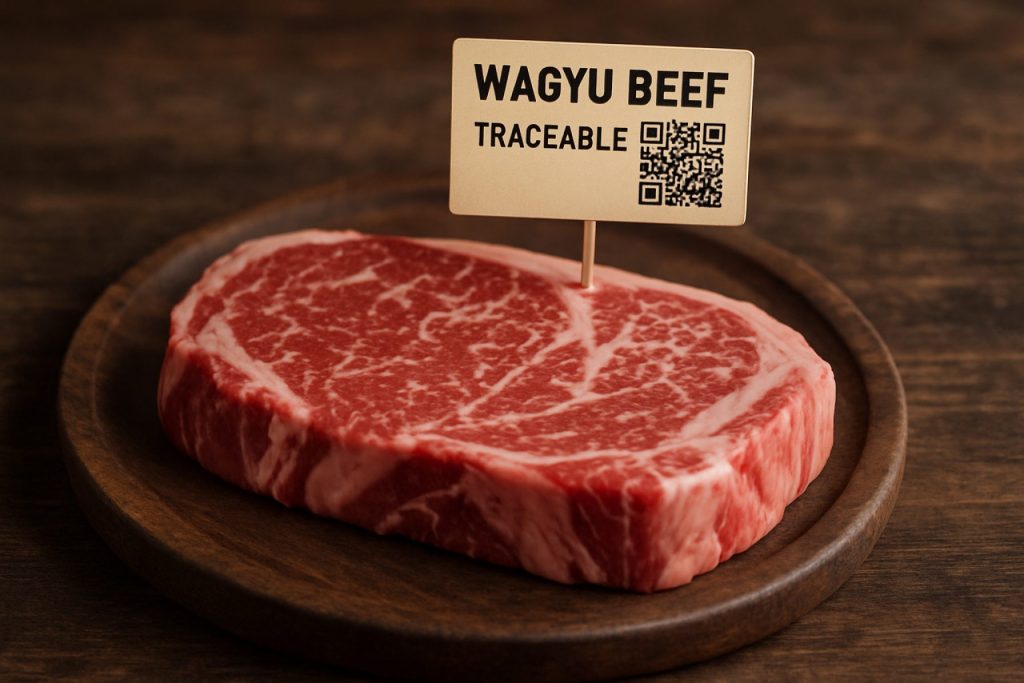
Unlocking the Truth Behind Every Cut: How Blockchain Traceability Is Revolutionizing Wagyu Beef Authenticity and Quality Assurance. Discover the Technology Ensuring Every Bite Is Genuine.
- Introduction: Why Traceability Matters in Wagyu Beef
- How Blockchain Technology Works in the Beef Supply Chain
- From Farm to Table: Tracking Wagyu Beef Every Step of the Way
- Combating Fraud and Ensuring Authenticity with Blockchain
- Benefits for Producers, Retailers, and Consumers
- Challenges and Limitations of Blockchain Traceability
- Case Studies: Real-World Applications in Wagyu Beef
- The Future of Premium Meat Traceability
- Sources & References
Introduction: Why Traceability Matters in Wagyu Beef
Wagyu beef is renowned worldwide for its exceptional marbling, flavor, and premium price, making it a highly sought-after luxury food product. However, the very qualities that make Wagyu valuable also render it vulnerable to fraud, mislabeling, and supply chain opacity. Traceability—the ability to track the journey of beef from farm to table—has become a critical concern for producers, regulators, and consumers alike. Ensuring the authenticity and provenance of Wagyu beef is essential not only for maintaining consumer trust but also for protecting the reputation and economic interests of legitimate producers.
Traditional traceability systems, often reliant on paper records or siloed databases, are susceptible to errors, tampering, and inefficiencies. These limitations can lead to significant challenges in verifying the origin, breed purity, and production practices associated with Wagyu beef. In response, the industry is increasingly turning to blockchain technology as a solution. Blockchain offers a decentralized, tamper-resistant ledger that can securely record every transaction and movement within the supply chain, from breeding and feeding to processing and distribution.
By leveraging blockchain, stakeholders can provide transparent, real-time access to verifiable data, thereby reducing the risk of fraud and enhancing food safety. This technological advancement not only benefits consumers seeking authentic Wagyu but also supports regulatory compliance and market differentiation for producers. As such, blockchain-based traceability is poised to become a cornerstone of the premium beef industry, ensuring that the story behind every cut of Wagyu is as genuine as its taste and texture (Food and Agriculture Organization of the United Nations; IBM).
How Blockchain Technology Works in the Beef Supply Chain
Blockchain technology operates as a decentralized, tamper-resistant ledger that records every transaction or event in the Wagyu beef supply chain. Each participant—ranchers, processors, distributors, and retailers—logs data onto the blockchain at every stage, such as animal birth, feed type, veterinary treatments, slaughter, and shipment. This data is time-stamped and cryptographically secured, ensuring that once information is entered, it cannot be altered retroactively. For Wagyu beef, where provenance and authenticity are critical, blockchain provides a transparent and immutable record from farm to table.
In practice, each Wagyu animal is assigned a unique digital identity, often linked to physical identifiers like RFID tags or QR codes. As the animal progresses through the supply chain, stakeholders scan these identifiers and upload relevant data to the blockchain. This creates a comprehensive, chronological history accessible to all authorized parties, including consumers, who can verify the beef’s origin and journey by scanning a code on the final product packaging. This process not only deters fraud and mislabeling but also enhances food safety by enabling rapid traceability in case of contamination or recalls.
Several pilot projects and commercial solutions have demonstrated the effectiveness of blockchain in beef traceability. For example, IBM Food Trust and Provenance have implemented blockchain-based systems that track livestock and meat products, including premium beef, across global supply chains. These initiatives highlight blockchain’s potential to build trust, improve transparency, and add value to Wagyu beef by guaranteeing its authenticity and quality.
From Farm to Table: Tracking Wagyu Beef Every Step of the Way
The journey of Wagyu beef from farm to table involves a complex supply chain, often spanning multiple stakeholders including breeders, feedlots, processors, distributors, and retailers. Blockchain technology enables comprehensive traceability throughout this process by recording every transaction and movement of the beef on a decentralized, tamper-proof ledger. Each animal is assigned a unique digital identity, often linked to physical identifiers such as RFID tags or QR codes, which are scanned and updated at each stage of the supply chain. This ensures that critical data—such as breeding lineage, feed regimen, health records, and transport conditions—are immutably stored and accessible in real time.
For consumers and regulators, this level of transparency provides assurance regarding the authenticity and quality of Wagyu beef, helping to combat fraud and mislabeling. Producers and retailers can also leverage blockchain data to optimize logistics, verify compliance with animal welfare standards, and respond swiftly to food safety incidents by pinpointing the exact origin of any issue. Notably, initiatives like the Mitsui & Co., Ltd. blockchain traceability project in Japan have demonstrated the practical application of these systems, allowing end consumers to scan a code on the packaging and instantly access the full history of their Wagyu purchase.
Ultimately, blockchain traceability transforms the Wagyu beef supply chain into a transparent, accountable ecosystem, fostering trust among all participants and supporting premium pricing for verified, high-quality products.
Combating Fraud and Ensuring Authenticity with Blockchain
The premium status and high market value of Wagyu beef make it a frequent target for food fraud, including mislabeling and substitution with lower-quality meats. Blockchain technology offers a robust solution to these challenges by providing an immutable, transparent ledger that records every transaction and movement in the Wagyu beef supply chain. Each step—from breeding and feeding to slaughter, processing, and distribution—is logged on the blockchain, creating a tamper-proof record that can be accessed by all stakeholders, including regulators, retailers, and consumers.
By leveraging blockchain, producers can assign unique digital identities to individual animals or batches, linking them to verified data such as genetic lineage, farm of origin, and feeding protocols. This level of traceability makes it exceedingly difficult for counterfeit products to enter the supply chain undetected. For example, QR codes or RFID tags can be scanned at any point, instantly verifying the authenticity and provenance of the beef. This not only deters fraudulent practices but also builds consumer trust, as buyers can independently confirm the legitimacy of their purchase.
Several industry initiatives and pilot projects have demonstrated the effectiveness of blockchain in combating food fraud. For instance, the IBM Food Trust platform has been used to enhance traceability and transparency in various high-value food sectors, including premium beef. As regulatory bodies and industry groups increasingly recognize the value of blockchain, its adoption is expected to become a standard for ensuring authenticity in the Wagyu beef market.
Benefits for Producers, Retailers, and Consumers
The implementation of blockchain traceability in the Wagyu beef supply chain offers significant benefits for producers, retailers, and consumers alike. For producers, blockchain provides a secure and immutable record of each animal’s lineage, health records, and feeding practices. This transparency helps protect the reputation of authentic Wagyu breeders and enables them to command premium prices by proving the provenance and quality of their beef. Additionally, streamlined data management reduces administrative burdens and the risk of fraud, as all stakeholders can access real-time, tamper-proof information IBM.
Retailers benefit from enhanced supply chain visibility, which allows them to verify the authenticity of Wagyu beef and ensure compliance with food safety standards. This traceability reduces the risk of recalls and strengthens relationships with discerning customers who demand transparency. Retailers can also leverage blockchain data in marketing, highlighting the verified origin and quality of their products to differentiate themselves in a competitive market GS1.
For consumers, blockchain traceability delivers unprecedented confidence in the authenticity and safety of Wagyu beef. By scanning a QR code on the packaging, buyers can access detailed information about the animal’s origin, breeding, and journey through the supply chain. This empowers consumers to make informed purchasing decisions and fosters trust in both the product and the brand. Ultimately, blockchain traceability strengthens the entire Wagyu beef ecosystem by promoting transparency, accountability, and value at every stage Food Safety News.
Challenges and Limitations of Blockchain Traceability
While blockchain technology offers significant promise for enhancing the traceability of Wagyu beef, several challenges and limitations hinder its widespread adoption and effectiveness. One primary concern is the integration of blockchain systems with existing supply chain infrastructure. Many stakeholders in the Wagyu beef industry, particularly small-scale farmers and processors, may lack the technical expertise or resources to implement and maintain blockchain solutions, leading to potential gaps in data entry and system interoperability (Food and Agriculture Organization of the United Nations).
Another limitation is the reliance on accurate and honest data input at each stage of the supply chain. Blockchain can only guarantee the immutability of recorded data, not its veracity. If incorrect or fraudulent information is entered—whether intentionally or due to human error—the blockchain will perpetuate these inaccuracies, undermining the system’s reliability (Organisation for Economic Co-operation and Development).
Scalability and transaction costs also pose significant barriers. As the volume of data and number of participants increase, blockchain networks may experience slower transaction speeds and higher costs, which can be prohibitive for large-scale or global Wagyu beef supply chains (World Economic Forum). Additionally, concerns about data privacy and the protection of proprietary information may deter some stakeholders from fully participating in transparent blockchain systems.
Addressing these challenges requires industry-wide collaboration, investment in digital literacy, and the development of standardized protocols to ensure the integrity and scalability of blockchain-based traceability for Wagyu beef.
Case Studies: Real-World Applications in Wagyu Beef
Several pioneering initiatives have demonstrated the practical benefits of blockchain traceability in the Wagyu beef industry. In Japan, the Mitsui & Co., Ltd. partnered with blockchain technology providers to launch a system that tracks Wagyu beef from farm to table. This platform records immutable data on cattle lineage, feed, health, and transport, allowing consumers and retailers to verify the authenticity and quality of the beef via QR codes on packaging. The transparency provided by this system has helped combat food fraud and increased consumer trust in premium Wagyu products.
In Australia, BeefLedger has implemented a blockchain-based supply chain for Wagyu beef exports to China. Their platform integrates blockchain with Internet of Things (IoT) devices to monitor temperature, location, and handling conditions throughout the shipping process. This not only ensures product integrity but also provides real-time updates to stakeholders, reducing the risk of spoilage and counterfeiting. The project has been recognized for enhancing traceability and supporting premium pricing for verified Wagyu beef.
These case studies illustrate how blockchain traceability is being leveraged to address key challenges in the Wagyu beef sector, such as provenance verification, supply chain transparency, and consumer confidence. As adoption grows, these real-world applications serve as models for other regions and premium meat industries seeking to enhance trust and value through digital innovation.
The Future of Premium Meat Traceability
The future of premium meat traceability is being fundamentally reshaped by the integration of blockchain technology, particularly in the Wagyu beef industry. As consumer demand for transparency, authenticity, and food safety intensifies, blockchain offers a decentralized and tamper-proof ledger that records every stage of the Wagyu beef supply chain—from breeding and feeding to processing and distribution. This level of traceability not only reassures consumers about the origin and quality of their purchase but also helps combat fraud and mislabeling, which are persistent issues in the premium meat market. For instance, blockchain-enabled systems allow stakeholders to access immutable data on animal lineage, feed regimens, and health records, ensuring that only genuine Wagyu beef reaches the market.
Looking ahead, the adoption of blockchain traceability is expected to become a standard in the premium meat sector, driven by regulatory pressures and evolving consumer expectations. Governments and industry bodies are already piloting blockchain projects to enhance food safety and export credibility. For example, initiatives supported by the Ministry of Agriculture, Forestry and Fisheries of Japan and collaborations with technology providers are setting new benchmarks for traceability. As these systems mature, they will likely integrate with other digital technologies such as IoT sensors and AI analytics, further enhancing data accuracy and supply chain efficiency. Ultimately, blockchain traceability is poised to redefine trust and value in the premium meat market, making provenance a key differentiator for Wagyu beef and other high-value proteins.
Sources & References
- Food and Agriculture Organization of the United Nations
- IBM
- Provenance
- Mitsui & Co., Ltd.
- GS1
- BeefLedger
- Ministry of Agriculture, Forestry and Fisheries of Japan



